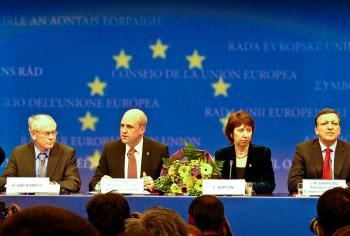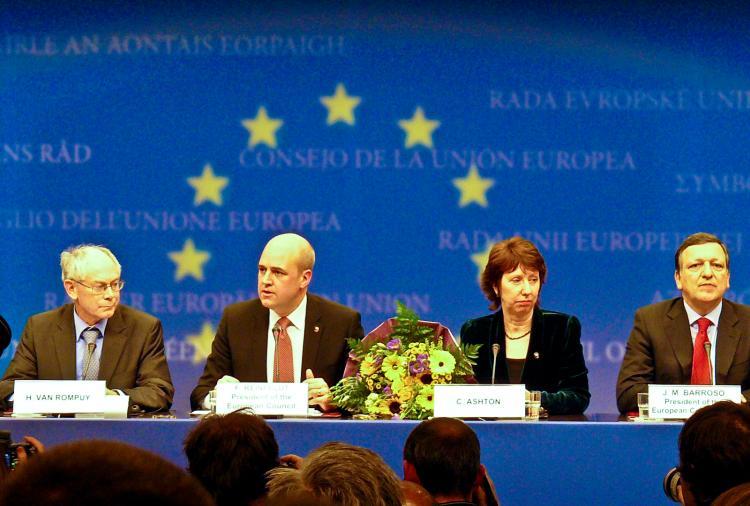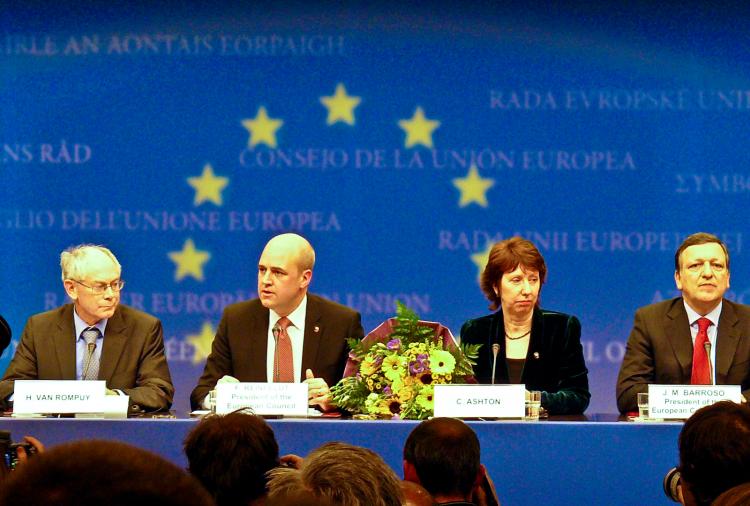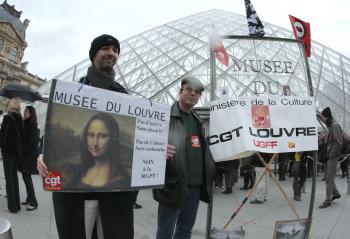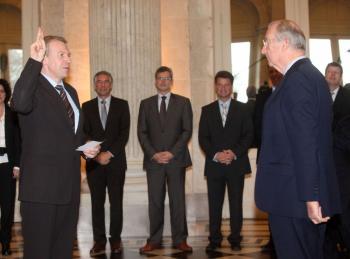BRUSSELS, Belgium—Over a private dinner of grilled, line-caught bass, Europe’s heads of state reached a consensus on Thursday on the European Union’s first-ever president: Belgium Prime Minister Herman van Rompuy.
Van Rompuy has no star allure, but he is considered experienced, reliable, and an expert diplomat. The father of four also has a philosophical streak, authoring several books like his latest offering “Searching for Wisdom,” which explores questions like “What drives us?” and “How can we arrive at what’s good, true, and beautiful?”
“As it is my custom in Belgian politics I will remain discreet. … It’s a habit I already got into and I shall continue with it,” van Rompuy said in a press conference in Brussels after being appointed with the position.
Van Rompuy became a serious candidate for the top job two weeks ago, in the second round of the selection process headed by Sweden’s PM Fredrik Reinfeldt. Van Rompuy got the support of France and Germany, but at the time lost it among smaller East European countries who didn’t like that he was being backed by the two political giants. Britain’s Gordon Brown had pushed for former U.K. Prime Minister Tony Blair.
Observers say that van Rompuy was favored because of his language skills and experience as a negotiator, and as someone who would be unlikely to hold to a strong personal political agenda.
“I did not seek this high position. I didn’t make any steps to achieve it. But from tonight I take on this task with conviction and enthusiasm,” said van Rompuy.
Van Rompuy became Belgium’s Prime Minister on New Year’s Eve 2008. At the time, Belgium was in crisis. The government had fallen and media reports talked about the “imminent separation” of the country. Belgium’s King saw van Rompuy as the only man for the job and ultimately convinced him to take the post.
Less than one year later, Europe’s man of destiny now finds himself president of the EU.
The presidency was one of the two key posts that had to be filled before the Lisbon Treaty goes into effect on Dec. 1. The other position, the high representative of the Union for Foreign Affairs and Security Policy, goes to Britain’s Catherine Margaret Ashton; it was also announced on Thursday.
“I was the first women British commissioner, the first women trade commissioner, and so I’m also proud to be the first women high representative of Europe,” Ashton said at the press conference.
The function of EU president, formally called president of the European Council, is to promote unity across the 27 member states, and to represent EU views on the international stage for two and a half years. Different than the president of the United States, the president of the European Council does not have powers of veto, no influence on the military, and does not direct the European Union’s foreign policy.
Van Rompuy and Ashton’s first challenge will be to help define the scope of their new jobs, which is not clearly spelled out in the Treaty.
Van Rompuy has no star allure, but he is considered experienced, reliable, and an expert diplomat. The father of four also has a philosophical streak, authoring several books like his latest offering “Searching for Wisdom,” which explores questions like “What drives us?” and “How can we arrive at what’s good, true, and beautiful?”
“As it is my custom in Belgian politics I will remain discreet. … It’s a habit I already got into and I shall continue with it,” van Rompuy said in a press conference in Brussels after being appointed with the position.
Van Rompuy became a serious candidate for the top job two weeks ago, in the second round of the selection process headed by Sweden’s PM Fredrik Reinfeldt. Van Rompuy got the support of France and Germany, but at the time lost it among smaller East European countries who didn’t like that he was being backed by the two political giants. Britain’s Gordon Brown had pushed for former U.K. Prime Minister Tony Blair.
Observers say that van Rompuy was favored because of his language skills and experience as a negotiator, and as someone who would be unlikely to hold to a strong personal political agenda.
“I did not seek this high position. I didn’t make any steps to achieve it. But from tonight I take on this task with conviction and enthusiasm,” said van Rompuy.
Van Rompuy became Belgium’s Prime Minister on New Year’s Eve 2008. At the time, Belgium was in crisis. The government had fallen and media reports talked about the “imminent separation” of the country. Belgium’s King saw van Rompuy as the only man for the job and ultimately convinced him to take the post.
Less than one year later, Europe’s man of destiny now finds himself president of the EU.
The presidency was one of the two key posts that had to be filled before the Lisbon Treaty goes into effect on Dec. 1. The other position, the high representative of the Union for Foreign Affairs and Security Policy, goes to Britain’s Catherine Margaret Ashton; it was also announced on Thursday.
“I was the first women British commissioner, the first women trade commissioner, and so I’m also proud to be the first women high representative of Europe,” Ashton said at the press conference.
The function of EU president, formally called president of the European Council, is to promote unity across the 27 member states, and to represent EU views on the international stage for two and a half years. Different than the president of the United States, the president of the European Council does not have powers of veto, no influence on the military, and does not direct the European Union’s foreign policy.
Van Rompuy and Ashton’s first challenge will be to help define the scope of their new jobs, which is not clearly spelled out in the Treaty.
